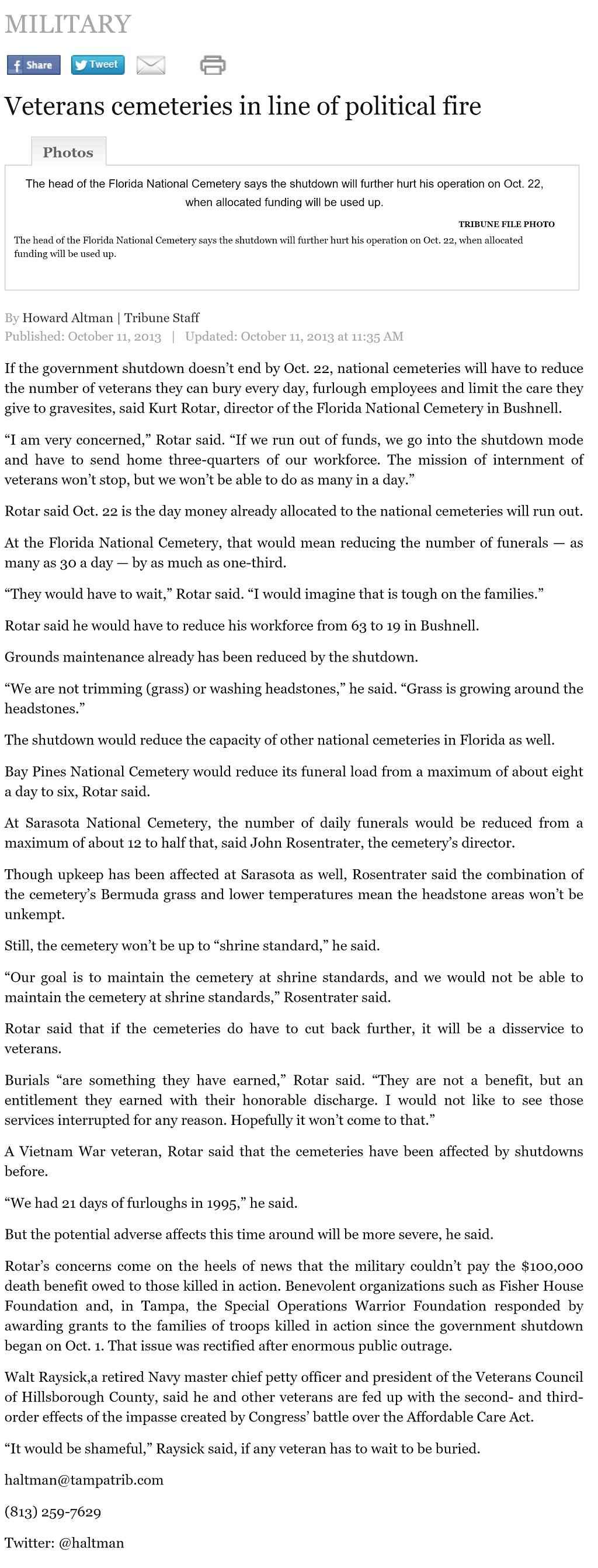
If the government shutdown doesn’t end by Oct. 22, national cemeteries will have to reduce the number of veterans they can bury every day, furlough employees and limit the care they give to gravesites, said Kurt Rotar, director of the Florida National Cemetery in Bushnell.
“I am very concerned,” Rotar said. “If we run out of funds, we go into the shutdown mode and have to send home three-quarters of our workforce. The mission of internment of veterans won’t stop, but we won’t be able to do as many in a day.”
Rotar said Oct. 22 is the day money already allocated to the national cemeteries will run out.
At the Florida National Cemetery, that would mean reducing the number of funerals — as many as 30 a day — by as much as one-third.
“They would have to wait,” Rotar said. “I would imagine that is tough on the families.”
Rotar said he would have to reduce his workforce from 63 to 19 in Bushnell.
Grounds maintenance already has been reduced by the shutdown.
“We are not trimming (grass) or washing headstones,” he said. “Grass is growing around the headstones.”
The shutdown would reduce the capacity of other national cemeteries in Florida as well.
Bay Pines National Cemetery would reduce its funeral load from a maximum of about eight a day to six, Rotar said.
At Sarasota National Cemetery, the number of daily funerals would be reduced from a maximum of about 12 to half that, said John Rosentrater, the cemetery’s director.
Though upkeep has been affected at Sarasota as well, Rosentrater said the combination of the cemetery’s Bermuda grass and lower temperatures mean the headstone areas won’t be unkempt.
Still, the cemetery won’t be up to “shrine standard,” he said.
“Our goal is to maintain the cemetery at shrine standards, and we would not be able to maintain the cemetery at shrine standards,” Rosentrater said.
Rotar said that if the cemeteries do have to cut back further, it will be a disservice to veterans.
Burials “are something they have earned,” Rotar said. “They are not a benefit, but an entitlement they earned with their honorable discharge. I would not like to see those services interrupted for any reason. Hopefully it won’t come to that.”
A Vietnam War veteran, Rotar said that the cemeteries have been affected by shutdowns before.
“We had 21 days of furloughs in 1995,” he said.
But the potential adverse affects this time around will be more severe, he said.
Rotar’s concerns come on the heels of news that the military couldn’t pay the $100,000 death benefit owed to those killed in action. Benevolent organizations such as Fisher House Foundation and, in Tampa, the Special Operations Warrior Foundation responded by awarding grants to the families of troops killed in action since the government shutdown began on Oct. 1. That issue was rectified after enormous public outrage.
Walt Raysick,a retired Navy master chief petty officer and president of the Veterans Council of Hillsborough County, said he and other veterans are fed up with the second- and third-order effects of the impasse created by Congress’ battle over the Affordable Care Act.
“It would be shameful,” Raysick said, if any veteran has to wait to be buried.
